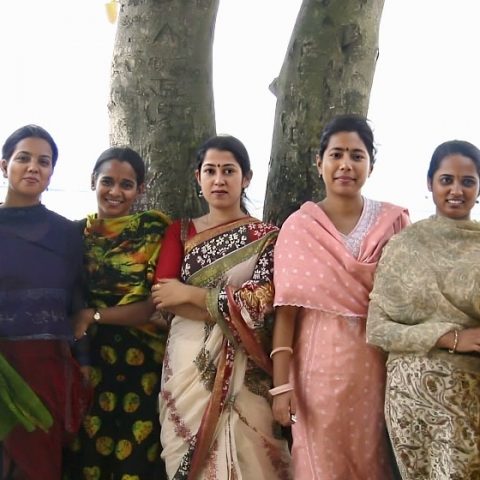The existence of health inequalities is one of the most pressing issues currently facing public health policymaking in Bangladesh. Interventions that engage municipal communities in their designs or delivery are thought to be more likely to address the specific needs of disadvantaged population, and community engagement has consequently become central to guidance and strategies for promoting public health in this country.
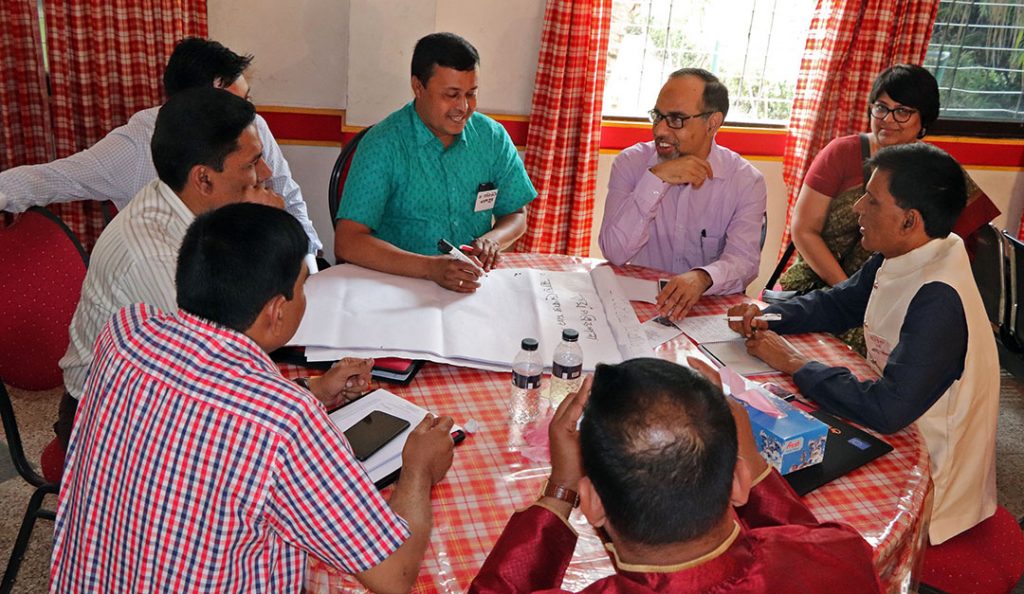
Municipal Mayors have the ability to influence the people living in and around the localities of his or her jurisdiction and have good rapport with policymakers. Therefore, they have great opportunities to bridge the gaps between their communities, health service providers and policymakers, to work out the most effective ways to ensure quality health services.
SHARE project of icddr,b in collaboration with the Jhenaidah Paurasabha, organised a mayoral conference in March 2018, in Jhenaidah Paurashabha Complex, Jhenaidah. The objective of the conference was to scale up the Chowgacha-Jhenaidah Model of community engagement to improve quality of healthcare services in nearby districts and sub-district hospitals.
Around 25 Mayors of Jhenaidah, Jessore, Meherpur and Chuadanga districts and and respective upazilla health managers attended this first-of-its-kind conference.
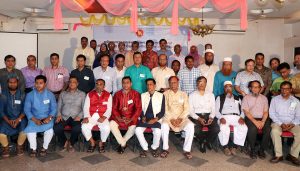
In this conference, the roles of municipalities and elected officials in national health system and providing efficient and quality health services to middle and low-income citizens of municipal areas were discussed by the local Mayors and government officials, health professionals and civil society members.
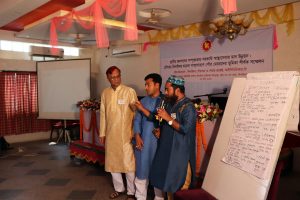
The inaugural of this Mayoral Conference was facilitated by Dr. Iqbal Anwar, Scientist and Director, SHARE project, icddr,b; while Mr Saidul Karim Mintu, Mayor, Jhenaidah Paurasabha, Jhenaidah, graced the occasion as the Chair and facilitated the event.
Mr. Ashadul Islam, Director General (Secretary in Charge), Bangladesh Employees Welfare Board, Ministry of Public Administration, Government of Bangladesh (GoB) was the Chief Guest of the Conference; while Prof. Dr. Nasima Sultana, Additional Director General (Admin), Directorate General of Health Services, Government of the People’s Republic of Bangladesh, was among the notable Special Guests.
Dr. Emdadul Haque, Ex-Senior Consultant, Gynecology, Jhenaidah Sadar Hospital, embarked the participants in a journey on the success of the famed and heavily successful Chowgacha Health Model, through a very interactive yet informative multimedia presentation.
The conference also gave way to group works and open discussions among the participants. During these interventions, the Mayors also identified four different stages of community engagement while addressing health service delivery in and around their localities:
- The first level is to deliver information to individuals or the community about the existing health facilities and services. This may involve messages in the form of public service announcements, fact sheets, information kits and websites.
- The second stage deals with consulting with individuals and the community and get feedback on the existing health services. This can be used successfully when community input is required to influence a decision on a preferred option by the elected officials and policy makers.
- Involvement with the communities is an integral part of the third stage of community engagement. By directly working with communities to explore healthcare issues it may be possible to progress discussions to policy development.
- The fourth and highest level of engagement is collaboration, where there is a partnership between the elected officials and the community population. At this level of engagement, the community can define their own goals and contribute to decision-making to address a collective health issue.
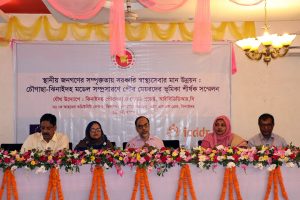
In their discussions and group works, the Mayors also mentioned a range of strategies to involve community citizens in health service decision making. Some of these include forming consumer advisory committees, including key community members on the decision making process and providing consultation about specific health issues to a particular group of people, which may be undertaken using methods such as focus groups and surveys.
In deciding suitable plans to engage the community in the health sector, specific attention needs to be given on how to successfully include, and represent, the diversity of individuals and communities in a particular municipal area.
In the group-work session, five groups were created among the attendees, consisting Civil Surgeons, Upazilla Health & Family Planning Officers and Mayors belonging to the same district. Each group presented the challenges they faced and possible way forwards to overcome them.
Key messages from the group works:
-
Development of advisory groups: Mayors, Civil Surgeons (CS), Upazilla Health & Family Planning Officers (UH&FPO), hospital administrative and civil societies will form advisory groups for effective and efficient regulation of hospitals. The groups will organize discussion sessions, preferably monthly or quarterly, to go through pressing issues faced by the hospitals and ways to overcome hurdles. Participants will be allowed to give feedbacks on the qualities of available health facilities, services and other aspects of the hospitals. The Mayors will also support CS and UH&FPO to build a friendly correlation with general public.
-
Cleanliness and beautification: Mayors will take initiatives to deploy additional cleaners and janitors in the hospitals. Hospital administrative and Paurashabha will jointly clean the facilities once in a month. Tree plantation in and around the hospital areas will also take place during this time.
-
Problems with ‘middlemen/dalals’: Mayors will come up with strict guidelines to keep the hospitals and the surrounding areas free from middlemen/dalals. If needed, they will take necessary help from law enforcement authorities in this regard.
-
Medical waste disposal units: Mayors, in collaboration with the hospital administrative, will explore all the possibilities to establish proper medical waste disposal facilities.
-
Enhancing security of hospitals: Mayors, with the help of hospital administrative, will come up with and allocate extra funds to gear up security measures in and around hospitals, which will include interventions as, building boundary fences, adding street lamps and recruiting security guards.
The possible benefits of engaging elected officials and community population in general in health service delivery are plentiful, for both the parties. The local citizens can benefit from the development of better quality and more responsive health services and greater accountability for public funds. On the other hand, the Mayors and health managers can gain greater community ownership and investment and improved consumer and community satisfaction in their localities.

